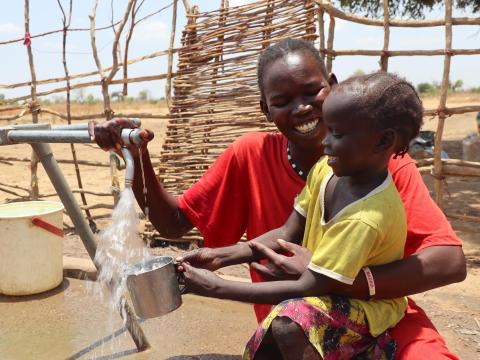No more long walks: Mothers have more time for their children with World Vision’s solar-powered water system

Angelina, 28-year-old mother of four, returned from Sudan in October 2021 to her community in Aweil County, a part of South Sudan’s Northern Bahr El Ghazal State.
“My first challenge was access to clean water. We walked for an hour to another village to fetch 20 litres which is not enough for the whole family. I have to spend six hours walking back and forth," she says.

Back in Khartoum, the water tankers supply the people’s homes with water at an affordable price. Her parents fled to Sudan as refugees during the decades-long conflict, and Angelina was among the children who grew up outside of her own country.
Fortunately for Angelina, with funding from UNHCR, World Vision installed a solar-powered water yard in Majokyithiou, located at the border between South Sudan and Sudan addressing concerns on the lack of water facilities.

The water station started operating in February 2022 serving 1,587 people with at least 20 litres per day. The project targets returnees, displaced people and those with special needs.
This reduced the long hours of walking for women and children. As most of the people in the host communities are pastoralists, the excess water were used for animal consumption during the dry season.
Safe and clean water helps ease the families’ burden. It reduces the health problems and the risks of diseases among children caused by consumption of contaminated water.
“Farming is what I know best, but I could not do it before because of the drought. Now, the water supply has not only solved the long-distance walk, but also given me a source of income as I am now able to cultivate in my homestead,” she shares happily.

The border town in Aweil East County is home to 2,620 returnees and 18,215 residents of the host communities. “I once watched my children get dehydrated and fell sick due to the scorching heat and lack of drinking water. With clean water nearby I have enough time to find food for my family," she adds.
Another mother of three, Mary, 30, who lived in Majokyithiou all her life shared that before the 2016 crisis, they had several boreholes in the community. They all broke down due to lack of maintenance and the community could not afford to repair them.

“We spend more time fetching water than taking care of our children. Children get malnourished for a lack of proper feeding as mothers were too tired after a day of getting water. All these were solved,, Mary says.
Project Manager Andama Joel shares, “Safe and clean water helps ease the families’ burden. It reduces the health problems and the risks of diseases among children caused by consumption of contaminated water."

Story and photos by Scovia Faida Charles Duku, Communications Coordinator